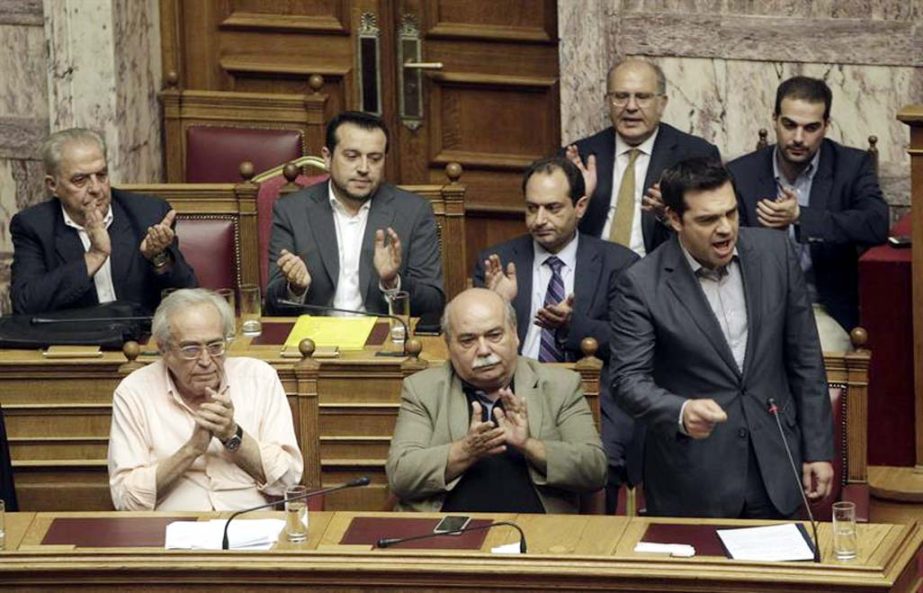
Reuters, Athens :
Prime Minister Alexis Tsipras battled to win lawmakers’ approval on Wednesday for a bailout deal to keep Greece in the euro and avoid bankruptcy, as the IMF pressured Greece’s creditors to provide massive debt relief for its crippled economy.
Having reluctantly agreed terms for negotiations on a third bailout from international lenders, Tsipras must face down a rebellion in his anti-austerity Syriza party to push sweeping pro-market reforms and spending cuts through parliament.
Dozens of MPs, including senior Syriza figures and the government’s junior coalition partner, could reject or partially reject the bailout, forcing Tsipras to rely on pro-European opposition lawmakers to carry the vote, which is expected after midnight. A snap election could follow if the prime minister’s majority collapses.
Adding to the uncertainty, a newly released study by the International Monetary Fund called for much more debt relief than European countries, particularly Germany, have been prepared to countenance so far.
Tsipras has described the deal as a “one-way street” imposed on Greece and the rest of his government shared his scepticism.
“It’s a difficult deal, a deal for which only time will show if it is economically viable,” Finance Minister Euclid Tsakalotos told lawmakers ahead of a crucial vote on the package later on Wednesday.
That may cause a dilemma in Germany, which has poured more money than any other country into rescuing Greece and where, after months of bad-tempered negotiations with Athens, there is increasingly vocal opposition to yet another bailout.
Berlin may wince at providing huge debt relief to a country it scarcely trusts to honor its promises, but insists on having the IMF in the negotiations to help keep Greece in line.
Washington has also stepped up pressure on both sides to secure a deal with NATO member Greece. U.S. Treasury Secretary Jack Lew is making a short-notice trip to Frankfurt, Berlin and Paris this week to press for a quick agreement.
Pointing to Washington’s importance in the talks, Deputy Prime Minister Yannis Dragasakis said the deal Tsipras struck with creditors might never have happened without U.S. pressure.
Although the bailout package is much tougher than the Greek people could have imagined when they resoundingly rejected a previous offer from the creditors in a referendum on July 5, most want to keep the euro.
Prime Minister Alexis Tsipras battled to win lawmakers’ approval on Wednesday for a bailout deal to keep Greece in the euro and avoid bankruptcy, as the IMF pressured Greece’s creditors to provide massive debt relief for its crippled economy.
Having reluctantly agreed terms for negotiations on a third bailout from international lenders, Tsipras must face down a rebellion in his anti-austerity Syriza party to push sweeping pro-market reforms and spending cuts through parliament.
Dozens of MPs, including senior Syriza figures and the government’s junior coalition partner, could reject or partially reject the bailout, forcing Tsipras to rely on pro-European opposition lawmakers to carry the vote, which is expected after midnight. A snap election could follow if the prime minister’s majority collapses.
Adding to the uncertainty, a newly released study by the International Monetary Fund called for much more debt relief than European countries, particularly Germany, have been prepared to countenance so far.
Tsipras has described the deal as a “one-way street” imposed on Greece and the rest of his government shared his scepticism.
“It’s a difficult deal, a deal for which only time will show if it is economically viable,” Finance Minister Euclid Tsakalotos told lawmakers ahead of a crucial vote on the package later on Wednesday.
That may cause a dilemma in Germany, which has poured more money than any other country into rescuing Greece and where, after months of bad-tempered negotiations with Athens, there is increasingly vocal opposition to yet another bailout.
Berlin may wince at providing huge debt relief to a country it scarcely trusts to honor its promises, but insists on having the IMF in the negotiations to help keep Greece in line.
Washington has also stepped up pressure on both sides to secure a deal with NATO member Greece. U.S. Treasury Secretary Jack Lew is making a short-notice trip to Frankfurt, Berlin and Paris this week to press for a quick agreement.
Pointing to Washington’s importance in the talks, Deputy Prime Minister Yannis Dragasakis said the deal Tsipras struck with creditors might never have happened without U.S. pressure.
Although the bailout package is much tougher than the Greek people could have imagined when they resoundingly rejected a previous offer from the creditors in a referendum on July 5, most want to keep the euro.

